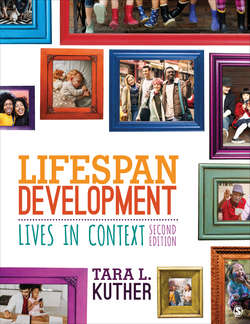Читать книгу Lifespan Development - Tara L. Kuther - Страница 412
На сайте Литреса книга снята с продажи.
Self-Concept
ОглавлениеThree- and 4-year-old children tend to understand and describe themselves concretely, using observable descriptors including appearance, general abilities, favorite activities, possessions, and simple psychological traits (Harter, 2012). For example, Wanda explains, “I’m 4 years old. I have black hair. I’m happy, my doggie is white, and I have a television in my room. I can run really fast. Watch me!” Wanda’s self-description, her self-concept, is typical of children her age. Soon children begin to include emotions and attitudes in their self-descriptions, such as “I’m sad when my friends can’t play,” suggesting an emerging awareness of their internal characteristics (R. A. Thompson & Virmani, 2010).
Children’s conceptions of themselves are influenced by their interactions with parents and the cultural context in which they are raised. In one study, preschool through second-grade U.S. and Chinese children were asked to recount autobiographical events and describe themselves in response to open-ended questions (Q. Wang, 2004). The U.S. children often provided detailed accounts of their experiences. They focused on their own roles, preferences, and feelings and described their personal attributes and inner traits positively. In contrast, Chinese children provided relatively skeletal accounts of past experiences that focused on social interactions and daily routines. They often described themselves in neutral or modest tones, referring to social roles and context-specific personal characteristics. These differences are consistent with cultural values of independence in the United States and collectivism in China. In another study, U.S. preschool children reported feeling more sadness and shame in response to failure and more pride in response to success than did Japanese preschool children (Lewis, Takai-Kawakami, Kawakami, & Sullivan, 2010). The Japanese preschool children displayed few negative emotions in response to failure but showed self-conscious embarrassment in response to success. Culture, then, influences how children come to define and understand themselves and even the emotions with which they self-identify (R. A. Thompson & Virmani, 2010).
